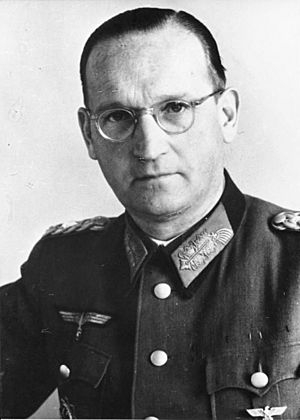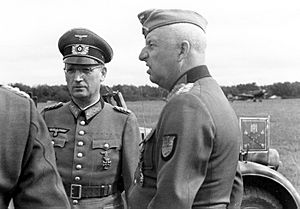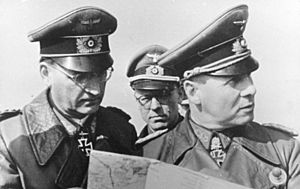Hans Speidel facts for kids
Quick facts for kids
Hans Speidel
|
|
|---|---|

Speidel in 1944
|
|
| Born | 28 October 1897 Metzingen, Kingdom of Württemberg, German Empire |
| Died | 28 November 1984 (aged 87) Bad Honnef, North Rhine-Westphalia, West Germany |
| Allegiance | |
| Service/ |
Army of Württemberg Reichsheer Army Bundeswehr |
| Years of service | 1914–45 1955–63 |
| Rank | Generalleutnant (Wehrmacht) General (Bundeswehr) |
| Commands held | NATO forces in Central Europe, 1957–1963 |
| Battles/wars | First World War Second World War |
| Awards | Knight's Cross of the Iron Cross Order of Merit of the Federal Republic of Germany |
| Other work | President of the German Institute for International and Security Affairs |
Hans Speidel (born October 28, 1897 – died November 28, 1984) was an important German general. He played a key role in building the new army of West Germany after World War II. This new army was called the Bundeswehr.
Speidel also helped West Germany join NATO, which is a group of countries that work together for defense. He was the first full General in West Germany. From 1957 to 1963, he was the commander of NATO's land forces in Central Europe. He was also a historian and wrote several books.
Contents
Early Life and Military Start
Hans Speidel was born in Metzingen, Germany. He joined the German Army in 1914 when the First World War began. He quickly became a second lieutenant. During the war, he was a company commander and an adjutant.
After the war, he stayed in the German Army. He also studied history and economics at different universities. In 1926, he earned his Ph.D. degree in history.
World War II Service

Speidel took part in the invasion of France in 1940. He became the Chief of Staff for the military commander in France. In 1942, Speidel was sent to the Eastern Front. There, he served as Chief of Staff for the 5th Army Corps. He later became Chief of Staff for the 8th Army in 1943 and was promoted to general.
In April 1944, Speidel became Chief of Staff to Field Marshal Erwin Rommel. Rommel was the Commander-in-Chief of Army Group B, which was stationed on the French Atlantic coast. When Rommel was injured, Speidel continued in his role for the new commander, Field Marshal Günther von Kluge.
Speidel once received an order from Hitler to attack Paris with V1 and V2 rockets. He chose not to pass on this order to his superior.
The 20 July Plot

Speidel was a professional soldier and a conservative. He agreed with some of Hitler's policies that aimed to make Germany strong again. However, he did not agree with the Nazis' cruel policies.
He became involved in a secret plan known as the 20 July Plot. This plan was to remove Hitler from power. Speidel was asked to try and get Field Marshal Rommel to join the plan. He had started to do this before Rommel was injured in July 1944.
After the attempt to remove Hitler failed, many people involved were arrested. Speidel was suspected and arrested by the Gestapo on September 7, 1944. Rommel tried to help Speidel get released. Speidel was held by the Gestapo for seven months. As Allied forces got closer, he managed to escape. He hid for a few weeks until French troops arrived in April 1945. Speidel was one of the few main people involved in the 20 July Plot who survived the war.
Building a New German Army
After World War II, Speidel became a very important military leader in West Germany. In 1950, he helped write a plan called the Himmerod memorandum. This plan discussed how to rearm West Germany after the war.
He was a key military advisor to Chancellor Konrad Adenauer. Speidel played a big part in creating the new German Army, the Bundeswehr. He later became a four-star general, one of the first in the Bundeswehr. He helped make sure the Bundeswehr worked well with NATO.
In April 1957, Speidel was appointed Supreme Commander of the Allied NATO ground forces in Central Europe. He held this important position until he retired in September 1963. His headquarters were in the Palace of Fontainebleau in Paris.
In 1960, Speidel took legal action against an East German film studio. The studio had shown him in a bad light, saying he was involved in assassinations and had betrayed Rommel. Speidel won his case and received money for the damage to his reputation.
Hans Speidel passed away in 1984 at the age of 87.
Honours and Awards
- Honorary citizen of Metzingen, 1972
- Grand Cross with Star and Sash of the Order of Merit of the Federal Republic of Germany, 1963
- German Cross in Gold, 1942
- Knight's Cross of the Iron Cross, 1944
- Goldene Württembergische Militärverdienstmedaille, 1917
- Iron Cross, first and second class, 1914
Images for kids
-
Speidel's grave at the Pragfriedhof in Stuttgart
See also
 In Spanish: Hans Speidel para niños
In Spanish: Hans Speidel para niños
- Assassination attempts on Adolf Hitler
 | Jewel Prestage |
 | Ella Baker |
 | Fannie Lou Hamer |


